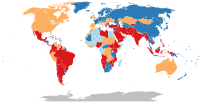
Photo from wikipedia
Suicide is a major health problem and a leading cause of death throughout the world. A primary goal for suicide prevention is reforming health professional education in order to increase… Click to show full abstract
Suicide is a major health problem and a leading cause of death throughout the world. A primary goal for suicide prevention is reforming health professional education in order to increase the competence of health professionals in assessing and managing suicide risk. Nursing leadership is involved in this reform, yet nurses frequently lack the competence to care for patients in suicidal crisis. An identified gap in baccalaureate nursing education is instructional competencies for assessing and managing suicide risk. A modified Delphi study was used. The study began with a focus group which was conducted in order to develop the Round I Survey which included forty-four competencies. After scoring these competencies, thirty-four were scored for inclusion, two were dropped and eight were revised according to panel members' comments. The Round II Survey comprised the eight revised competencies which were scored for inclusion, resulting in forty-two competencies in the final set of instructional competencies. Forty-two instructional competencies were developed: fourteen pre-assessment instructional competencies, fifteen assessment instructional competencies, and thirteen management instructional competencies. Incorporating these instructional competencies into baccalaureate nursing education might increase the competence of nursing students, and thus new nurses, in caring for patients at risk for suicide. These instructional competencies provide a first step to address the challenging task of intervening with patients at risk for suicide.
Journal Title: Issues in Mental Health Nursing
Year Published: 2017
Link to full text (if available)
Share on Social Media: Sign Up to like & get
recommendations!